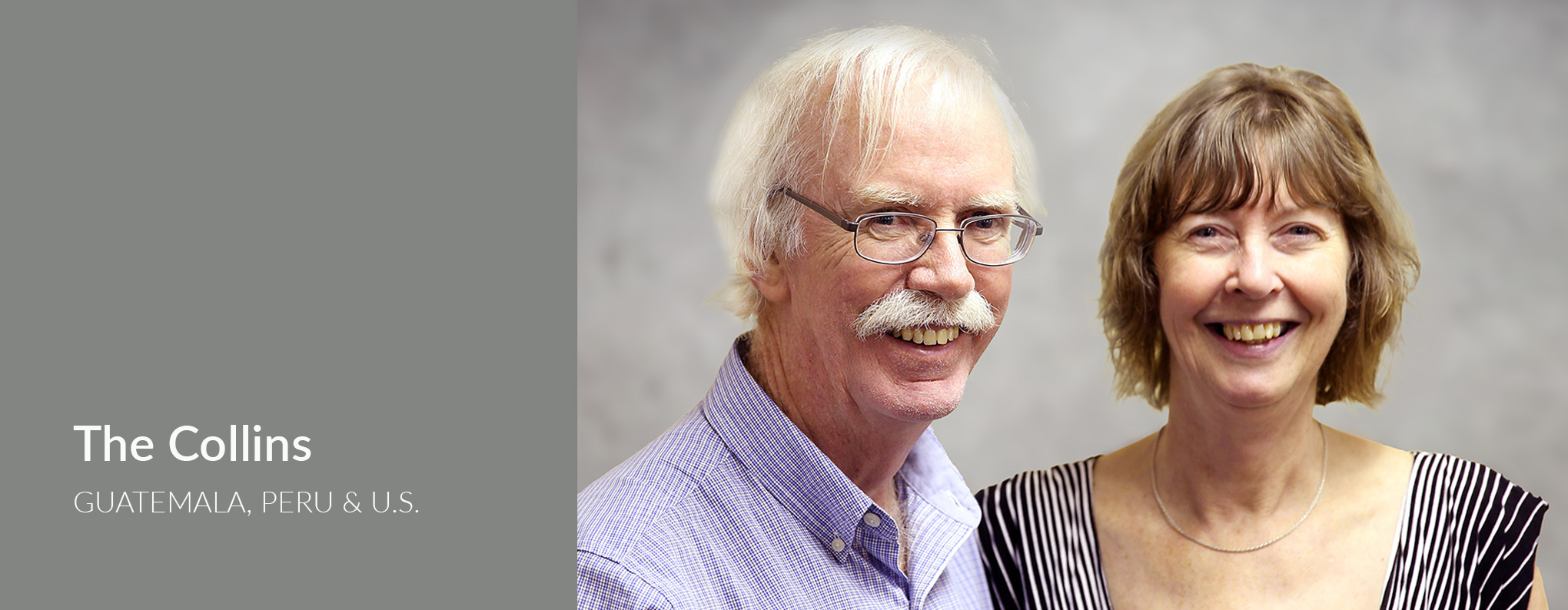
The Collins Family
Collins Family 2014 Summer Update
Dear and good friends,
Greetings from back in North Carolina, our home away from home. Actually, home is sort of a philosophical question for Nan and me—and even more so for the kids than for us. They have each established their own homes—Amalia and Kyle in Hawaii, Isaac and Elizabeth in Atlanta and Elisa and Yury here in Wake Forest. But for us, Wake Forest is more of an address where our mail accumulates than a place where we feel at home. As Buckeyes, we will never be Tarheels, but it’s not so bad, and the weather is lovely. And being in the South is kind of like learning another language and culture, something that we’ve done before.
Once, when Isaac was four, we were driving up from Guatemala to Ohio. We stopped one evening at a hotel to unload our suitcases and then we went off to find dinner. As we sat there, Isaac asked, “Dad, when are we going home?” I told him it would probably be four or five more days, since we were still in Mexico. To this he replied, “No, I mean home where we’re going to sleep tonight. So that’s my nearest definition. Home is where we’re going to sleep tonight. It’s a bittersweet thought. Sweet because the five of us were together, bitter because I’ve messed with what would be the “normal” definition of <home> for our sweet kids.
The best part of that is that my precious Nancy is often there sleeping wherever it is I happen to bunk down as well. Most recently that has been Lima, Peru. I taught phonology to 18 students from 7 different countries. This was an excellent group of students and I’d say that of the 15 most outstanding students I’ve ever had at the college level—including my time teaching at Ohio State—five of the very best are among these 18. It was a joy and a challenge to keep up with them. It makes me think that linguistic work in favor of the world’s minority peoples and languages is in good hands.
We are proud to have a part in their training. It was wonderful for me that Nancy was there with me.
So what is phonology? Phonology is the science of the sound systems of the world’s languages and the rules and generalizations that guide these systems. You might wonder, “What is there to guide?” All I do is talk and people understand me. That’s right. They understand you because you and they have learned the rules. Think about the letter <t> in English. It represents the <t> sound, like in the word <top>. If you hold a Kleenex, or a lit match safely near your mouth when you say the word <top>, you’ll see that the flame or Kleenex flickers. But if you do the same experiment with the word <stop>, it doesn’t flicker. That’s because the two different <t’s> are actually different sounds. Another sound of the letter <t> is the <t> in <button> (pronounced at normal speed). A fourth <t> sound is like the <t> in <batter>, where it sounds more like a <d> than a <t>. And a final <t> sound (in English) is at the end of a word like <pot> or <pit>. Most native speakers of English form the final <t> in these words with their tongue, but they don’t follow through pronouncing the rest of the sound. This final <t> is evidenced only by stopping the flow of air through the mouth. So the single letter <t> represents five different sounds in English. And native speakers know which rules apply and which sound gets pronounced.
The study of phonology supports the creation of an adequate alphabet, and helps determine whether the five sounds of the letter <t> should be written with a single letter like they are in English, or with two different letters or maybe even with five. It’s kind of a big deal, since literacy is such an important life skill, and it’s pretty easy to see how important an alphabet is to reading.
Nan and I will soon have the opportunity to see the “other side” of alphabets and their practical use. We are headed to Guatemala for the fifteenth anniversary of the presentation of the Mam New Testament on August 13. Our colleague Byron and his friends have put together quite a program with readings, testimonials, recitations, posters, contests and we’re not sure what else. He has told me that they’ve run promotions for the event in Mam on local radio and TV. Can you believe that a local cable company plays Mam videos on the air, and that Byron hosts a weekly Mam radio program? How cool is that?
It has been a wonderful privilege for us to be involved in helping to bring literacy and the readable and much-appreciated Scriptures to the Mam. Many of you have prayed for us and supported us in countless ways since we left for Guatemala back before our kids were born. Thank you so much for your perseverance. Literally many hundreds of people have been involved at all levels, and we’re very grateful, and humbled. Now we’re less involved in the day-to-day grind of literacy and translation, but we’re training others to do things similar to and beyond what we’ve been about for these many years.
Nan and I are looking forward to visiting our home church, Grace, in Ashland, on August 24, and we plan to be at Parkside in Bainbridge, Ohio on the 31st. If you are around, please stop by and say hello.
When I start these updates, I’m never quite sure where they are headed. I just keep writing and see where we go. This one wandered into semantics (and the meaning of “home”), and phonology.
I look forward to your comments, which are usually insightful, and Lord enabling, we will talk again before too long.
Best to all,
Wes and Nancy Collins
